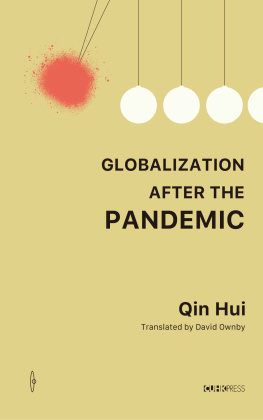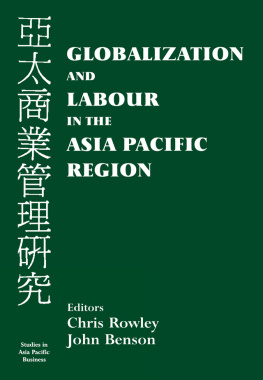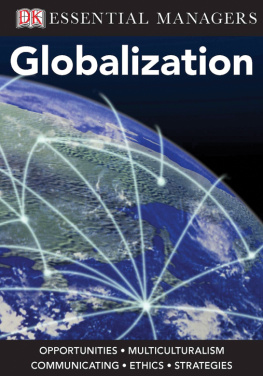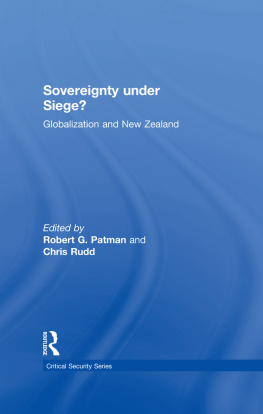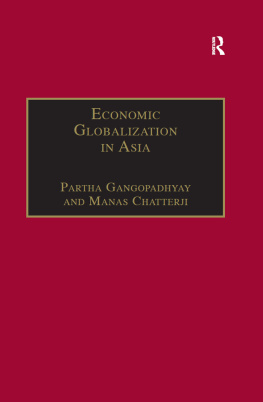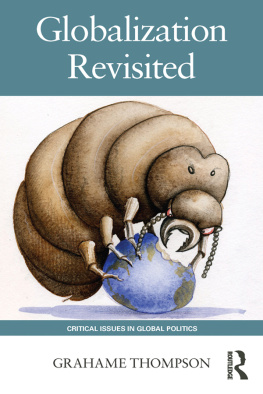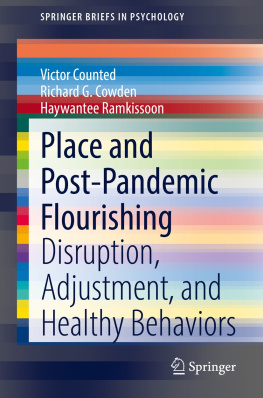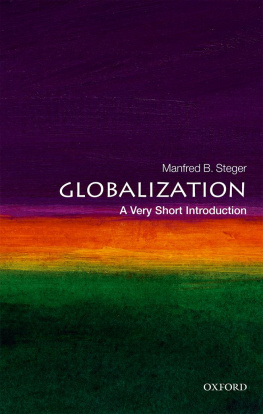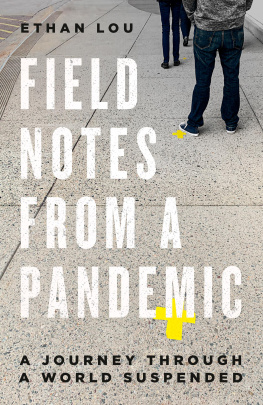Qin Hui (秦晖) - Globalization after the Pandemic
Here you can read online Qin Hui (秦晖) - Globalization after the Pandemic full text of the book (entire story) in english for free. Download pdf and epub, get meaning, cover and reviews about this ebook. year: 2021, publisher: The Chinese University of Hong Kong Press, genre: Politics. Description of the work, (preface) as well as reviews are available. Best literature library LitArk.com created for fans of good reading and offers a wide selection of genres:
Romance novel
Science fiction
Adventure
Detective
Science
History
Home and family
Prose
Art
Politics
Computer
Non-fiction
Religion
Business
Children
Humor
Choose a favorite category and find really read worthwhile books. Enjoy immersion in the world of imagination, feel the emotions of the characters or learn something new for yourself, make an fascinating discovery.
Globalization after the Pandemic: summary, description and annotation
We offer to read an annotation, description, summary or preface (depends on what the author of the book "Globalization after the Pandemic" wrote himself). If you haven't found the necessary information about the book — write in the comments, we will try to find it.
Globalization after the Pandemic — read online for free the complete book (whole text) full work
Below is the text of the book, divided by pages. System saving the place of the last page read, allows you to conveniently read the book "Globalization after the Pandemic" online for free, without having to search again every time where you left off. Put a bookmark, and you can go to the page where you finished reading at any time.
Font size:
Interval:
Bookmark:
Globalization after the Pandemic
Qin Hui is one of the most original thinkers and commentators active in China today. He has long courted controversy across the political spectrum by arguing that Chinas development model, based on a low human rights advantage, lacks both economic and political freedoms as well as social protection. In this wide-ranging and meticulously researched book he argues that the COVID-19 pandemic reveals decisive weaknesses in both the Chinese and European/American political systems.
While China early on chose to control the whistleblowers rather than the virus, Qin provocatively asks whether liberal democracies sometimes prioritized freedom over survival. If they do not want to lose the global battle against authoritarian states, he argues, democracies should adjust their response, just as China should turn away from high-tech authoritarianism and return to the path of protecting human rights.
While not everyone will agree with Qins conclusions, the rigor of his arguments, the broad historical and geographical range of his examples, and his commitment to defending human dignity around the world make for a compelling read and challenge all forms of pandemic complacency.
Sebastian Veg
School of Advanced Studies in the Social Sciences (EHESS), Paris
Globalization after
the Pandemic
Qin Hui
Translated by
David Ownby

The Chinese University of Hong Kong Press
Edges Series
Globalization after the Pandemic
By Qin Hu
Translated by David Ownby
The Chinese University of Hong Kong 2021
All rights reserved. No part of this publication may be reproduced or transmitted in any form or by any means, electronic or mechanical, including photocopying, recording, or any information storage and retrieval system, without permission in writing from The Chinese University of Hong Kong.
ISBN: 978-988-237-231-3
The Chinese University of Hong Kong Press
The Chinese University of Hong Kong
Sha Tin, N.T., Hong Kong
Fax: +852 2603 7355
Email: cup@cuhk.edu.hk
Website: cup.cuhk.edu.hk
Printed in Hong Kong
In the winter and spring of 2020, when the coronavirus erupted in China and then spread around the world, I had already been studying the world of contemporary Chinese establishment intellectuals for some time, mainly by translating and curating important examples of their work and sharing them via my website Reading the China Dream, Why are Chinese establishment intellectuals interesting? Because Chinas rise to superpower status, together with the Wests seeming decline in the first decade of the 21 st century, has convinced many of these intellectuals that world history is at a turning point as important as the moment when, for example, monarchies were replaced by democracies. Their reasoning is that both Soviet communism and American (or more broadly, Western) liberal democracy have failed economically and politically, while China surges forward. This means not only that China is the wave of the future, but also that Chinas (and the worlds) past, present, and future must be revisited, since most peoples basic vision of the world has been fundamentally shaped either by liberalismwhich focuses on the individual and market forcesor socialismwhich focuses on class struggle and the dialectic.
The belief that liberalism and socialism have both lost their explanatory value can be liberating (it is what motivates many postmodernists, after all), and between roughly 2000 and 2015, the world of Chinese establishment intellectuals exploded in a burst of creativity not seen since the Republican Period (19121949) as they sought to rethink the world and Chinas place in it, to reimagine contemporary Chinas founding myths. We are of course free to agree or disagree with Chinese establishment intellectuals, but as the worlds second largest economy and chief competitor with the United States, it behooves us to at least know what they are thinking, because while these figures are not dissidents, they are not propagandists either, as the book translated here richly illustrates.
The events of the spring and summer of 2020, when China largely bested the virus and the West did not, seemed in the eyes of many Chinese establishment intellectuals to confirm their view that China was rising and the West declining. I decided that Chinese intellectual commentary on the coronavirus and its management would likely become an important aspect of the broader ongoing discussion in China, and launched a project to attempt to follow along. The project also yielded the book translated here: by far the most interesting and surprising example of anything I read by Chinese establishment intellectuals talking about the coronavirus.
In this book, Qin Hui, one of Chinas most prominent liberal intellectuals and champions of human rights and democracy, who often publishes, in China, things that look to me very much like dissent, says essentially: it is a fact that Chinas authoritarian regime, through a combination of coercion and science, did a much better job than any major Western country in handling the pandemic, a fact which is destined to make China more powerful and more authoritarian. What are the supporters of democracy and human rights going to do about that? To drive the point home, Qin notes that if any countryor terrorist organizationever weaponizes something like the coronavirus and deploys it in a war, it is clear which side will win. Again, what are the supporters of democracy and human rights going to do about that?
Of course, not everyone knows who Qin Hui is.
Born in 1953, Qin was starting middle school in Nanning, the capital of the Guangxi Zhuang Autonomous Region, when Chinas Cultural Revolution began in 1966 and schools were closed so that Red Guards could make revolution. Qin joined a Red Guard faction that dared to rebel, an experience that gave him some of his first lessons in political hypocrisy; the distance between the political slogansthose of the Red Guards and those of the governmentand the reigning social reality provided much food for thought. In addition, luck had it that Qin had joined the losing side in a fight with huge personal consequences: he spent nine yearsbetween the ages of fifteen and twenty-fouras a sent-down youth in a mountainous remote Zhuang (a minority ethnicity in China) village on the border between Guangxi and Yunnan. Both the remoteness of the village and the length of Qins stay were conditioned by Qins early political faux pas . Qin nonetheless joined the Chinese Communist Party, of his own volition, during his stint in the countryside.
In 1978, when Chinas universities reopened, Qin managed to gain entry to an MA program in History, having skipped over middle school, high school, and university. Clearly, Qin had used his free time in the village to educate himself, even learning English, testimony to his great intelligence and energy, as well as the lack of much else meaningful to do. He studied in Lanzhou, in northwest China, in order to work with Professor Zhao Lisheng (19172007), a well-known specialist in the history of rural China, who at the time focused on topics such as peasant wars and landlord exploitation. Qin worked diligently on these subjects for at least a dozen years before enlarging his field of study, but the questions he asked and the answers at which he arrived continue to guide Qins work even today.
To make a long story short, Qin ultimately decided to abandon the classic approach to rural studies, an approach grounded in Marxist theory, and to replace it with a more empirical methodology, based in textual documentation or facts gathered through field-work. His research led him to reject the Marxist vision, which saw rural conflicts as the product of a class struggle between peasants and landlords; Qins interpretation was that these conflicts were the result of abuses perpetrated by an authoritarian state, in the form of arbitrary taxes, the appropriation of peasant property, or excessive corve labor exactions. Qins work, carried out at first with his professor and later with his wife, Jin Yan, a well-known specialist of the history of Russia and Eastern Europe, has both historical and comparative dimensions, and is impressive in its sophistication and complexity. His research also has implications for contemporary politics; the Peoples Communes established during the Great Leap Forward in 1957 had been abandoned in the early 1980s. The problem of Chinas rural orderor more broadly, the question of the treatment of Chinas rural populationthus emerged once again in the Reform and Opening period and in many senses still awaits a solution.
Font size:
Interval:
Bookmark:
Similar books «Globalization after the Pandemic»
Look at similar books to Globalization after the Pandemic. We have selected literature similar in name and meaning in the hope of providing readers with more options to find new, interesting, not yet read works.
Discussion, reviews of the book Globalization after the Pandemic and just readers' own opinions. Leave your comments, write what you think about the work, its meaning or the main characters. Specify what exactly you liked and what you didn't like, and why you think so.

